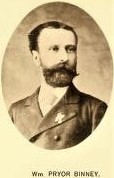
Wonderful to hear (3 Jan. 2026) that a team of volunteers has cleared up the charming but neglected Westerners’ Cemetery on Syros (Greek Cyclades), a small area that leads to the immaculately tended Commonwealth War Graves/Syra New British Cemetery, below Ano Syros. The original Westerners’ Cemetery site, including the memorial to William Pryor Binney, has been so badly maintained that the Commonwealth War Graves Commission even has a warning on its webpage, imploring those who want to visit to take great care: “Please remain within the pathway while accessing the CWGC plot due to danger of tripping on debris and being hit by falling stone from the damaged walls.” See the end of this article for photos.
People come and go; everyone travels; everyone leaves traces of their travels. You will find such a trace on a memorial in the rarely visited Westerners’ cemetery in Ermoupoli, on Cycladic Syros, near the junction of Taxiarchon and Katramadou, on the way to Ano Syros. The cross and monument of some grandeur is of fine Tinos marble; the inscription testifies to the trickiness of English lettering for Greek masons; it was expensive, and the deceased’s family wished to honour a significant man. There is no space for the word ‘kind’:
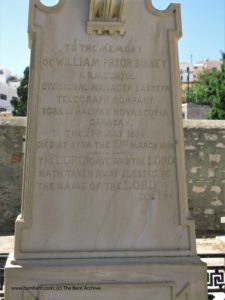
“To the Memory of William Pryor Binney, H.B.M. Consul, Divisional Manager Eastern Telegraph Company. Born in Halifax Nova Scotia, Canada, the 21th [sic] July 1839, died at Syra the 12th March 1888. The Lord gave and the Lord hath taken away. Blessed be the name of the Lord. Job 1, 21.”
The year of Binney’s birth, however, is given as 1840 in an arcane ‘Genealogy of the Binney family in the United States’, published by Charles James Fox Binney in 1886 (Albany, N.Y., J. Munsell’s Sons):
“William Pryor Binney, son of Stephen and Emily (Pryor) Binney, of Moncton, N[ew] B[runswick], was born July 21, 1840; married Polexine [Polyxena/Πολυξένη] Pateraki, daughter of the late George Pateraki[s], of Constantinople. Mr. Binney is the general manager of the submarine telegraph cable in the kingdom of Greece and Turkey, has held the office for twenty-five years past, and in 1884, lived at Syra, Greece. He is H.B.M. consul at Syra. Had no children in 1873. He had the title of Chevalier from the King of Greece and decoration of the order of the Saviour and order of the Iron Cross, from the Emperor of Austria.”
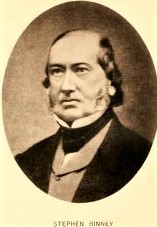
The first Binney to surface, one captain John, of Nottinghamshire, set sail with his wife Mercy in 1678 or 1679, for Hull, Massachusetts. There, with John now a ‘fisherman’ and ‘gentleman’, the couple (with their six children) became the ‘ancestors of almost all of the name’. In the 19th century one of their descendants, Stephen Binney (1805–1872), a merchant of Halifax, and later first mayor, married Emily Pryor (1808 and still living in 1884); the couple had seven children, one of whom was our William Pryor Binney and Mabel remembers him for posterity as ‘kind’. As Halifax mayor, in early 1842 Stephen made the long Atlantic crossing to London with a message of congratulations on behalf of the city to Queen Victoria on the birth of her son (later King Edward VII). During his extended absence his business affairs at home suffered and he sought new opportunities, buying property near Moncton (New Brunswick). From his new base, Stephen Binney set up a successful wharf and shipyard, making a new start as a wholesaler, trading in timber and agricultural produce. With its access to the Bay of Fundy, and William’s father thrived as a merchant ship-owner, with a vessel that bore his own name, the ‘Stephen Binney’.
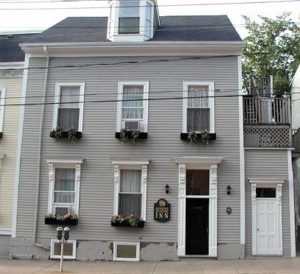
It was Stephen’s father (William’s grandfather), Hibbert Newton Binney, who forged links initially with the Pryors, when the two families cooperated on the building of a fine house in Halifax in 1831, and which H.N. Binney then bought outright in 1834. The ‘Pryor-Binney House’ still stands at 5178 Morris Street, Halifax.
One of William’s brothers was Moncton’s head of Customs, Irwine Whitty Binney (b. 1841). It was probably Irwine, as prosperous clan head, who supervised in some way William’s funeral in 1888, in the quiet Westerners’ cemetery on Syros. William’s widow, Πολυξένη, being Orthodox, probably rests in the Greek cemetery a few 100 metres away. We don’t know when the couple married (1860s?); Polyxena’s father, George Paterakis, was from Constantinople, and probably of some standing. The Binneys had had no children by 1873.
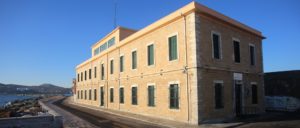
And of William’s career? And how he came to Syros? Follow the money. William, as part of a very well-to-do and successful extended family who made their livings from commerce, merchant-shipping and the sea, was clearly ambitious to compete and strike out on his own; and quite prepared to travel and leave traces of his own. By the mid 1880s maritime nations were being linked by the invention of undersea cable-telegraphy, and the needs of the British Empire provided a booming market for companies in this sector. One of these was the Eastern Telegraph Company, a consolidation, in 1872, of a dynamic group of telegraphy businesses, involving some 23,000 miles of cabling by the late 1880s. This enterprise, of course, morphed eventually into today’s Cable and Wireless plc. A pivotal routing and operations hub for the Eastern Mediterranean, and British interests East, was based on Syros, and its capital, Ermoupoli, the main ‘port’ for all (‘new’) Greece before the growth of Pireaus around 1900. It was plain commercial sense that the Eastern Telegraph Company’s regional cable station and depot should be built on a (then) disconnected rock (Νησάκι), a hop from Ermoupoli’s seafront. The solid building (which probably housed Binney’s consular office too) still stands and now houses the island’s Merchant Marine Academy.
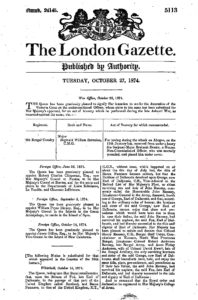
William Binney held the important post of general manager for ETC’s Syros hub by 1883 at least, if not earlier; it is recorded that he had already been an employee for 25 years by around that date. His skillset obviously included diplomacy, and in 1874 we learn that “the Queen has been graciously pleased to appoint William Pryor Binney, Esq., to be Her Majesty’s Consul in the Islands in the Greek Archipelago, to reside in the Island of Syra [Foreign Office, September 5, 1874. The London Gazette, 24145/5113, Tuesday, October 27, 1874, and ‘The Morning Post’ of Wednesday, October 28, 1874].
Presumably this appointment helped Binney acquire his gongs, i.e. “the title of Chevalier from the King of Greece and decoration of the order of the Saviour and order of the Iron Cross, from the Emperor of Austria.” His duties would have included looking after his country’s interests and personnel in the region and reporting on the activities of potential rivals. Copies of communications between William and the UK Foreign Office can be found in the FO Volumes of the British Consuls in Greece, in the National Archive, Kew (i.e. 1881 FO 32/534; 1882 FO 32/546; 1892 FO 32/644; 1893 FO 32/653).
And as well as all this, Mabel Bent refers to William as not only fastidious, but ‘kind’ (she adds ‘so’ and underlines it). Theodore Bent met Binney first in Athens, in late November 1883. He became a friend it seems as well as Consul, providing the Bents with information and letters of introduction to contacts in the Cyclades generally. Theodore at this time was not particularly influential and it seems that Binney was being helpful to a British citizen as part of his consular duties. One of the contact names he slipped into Theodore’s pocket was Robert M.W. Swan, a Scottish miner on Antiparos. Swan was later to be central to Bent’s expedition to ‘Great Zimbabwe’ for Cecil Rhodes in 1891. But by then Binney was dead.
Let’s leave the last paragraphs on kind William Pryor Binney to Mabel Bent, as recorded in the pages of her Greek ‘Chronicles’. The final reference to his fatal illness comes as a shock:
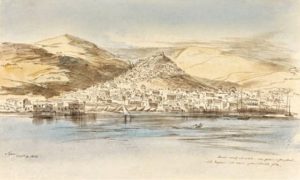
“[Saturday, 1 December 1883] We had a quick but very rough passage, starting at 7 and getting [to Syros] about 3.30 a.m. Wednesday [28 November]. The ‘Pelops’ was quite new and very clean and I should have slept well but for the fleas. We landed at Ermoupolis at 6.30 and sat on the balcony overlooking the port for 2 hours as there was no bedroom vacant, nor did we get one till 5 o’clock. Mr. John Quintana, H.B.M. Vice Consul on whom Theodore called, came and fetched us and we spent 2 hours at the Consulate in Mr. Binney, the Consul’s room, very large and nice and so tidy. Mr. Binney must be a most orderly man for everything was ticketed and docketed. Theodore called on him in Athens, says he is like a slight Greek, foreign accent and Greek wife.” [Mabel Bent’s Greek ‘Chronicles’, pages 7–8]
“[Tuesday, 18(?) December 1883]. Rode 1½ hour to the nearest point to Antiparos carrying only our night things and a card of introduction from Mr. Binney for Mr. R. Swan who has a calamine mine on this island.” [Mabel Bent’s Greek ‘Chronicles’, page 21]
“[Saturday, 22 March 1884] We fortunately got a room at the Hôtel d’Angleterre [Syros] and thoroughly enjoy ‘taking mine ease in mine inn’. We packed a box of our spoils for England and this afternoon I rode and the others walked to Ano or Upper Syra, a hideous place with a view over this barren island. We got very tired of Syra by Friday and as we found a kaïke of Kythnos or Thermiá we packed and prepared to start. But the strong Boreas would not permit ships to leave the port so after constant expectations up to Sunday morning the 23rd we gave up and went to church, a very poor little place and very ‘low’, according to the wishes of Mr. Binney the Consul. Afterwards we lunched with Mr. Binney, Mr. Quinney the parson, being there also. N.B. Mr. Binney’s clerk is Mr. Finney.” [Mabel Bent’s Greek ‘Chronicles’, page 54]
“[Thursday, 26 January 1888] We only got to Syra on Thursday. We landed
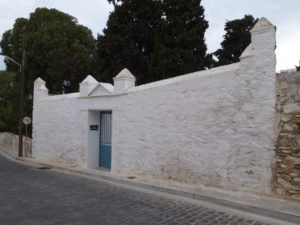
and found to our sorrow that our kind consul Mr. Binney was dreadfully ill.” [Mabel Bent’s Greek ‘Chronicles’, page 228]
“[Saturday, 25 February 1888] On Thursday… about 4 we left ‘The Town’ [Constantinople] in the ‘Alphée’ for Syra, picking up letters at the post on the way. We had no remarkable fellow passengers and reached Syra on Saturday morning about 4… We went to church on Sunday to a tidy little chapel, which they say will be closed if Mr. Binney is no longer there to keep it up.” [Mabel Bent’s Greek ‘Chronicles’, page 234]
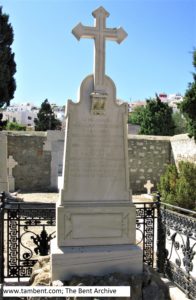
Kind William Pryor Binney died 16 days after Mabel’s last reference to him, on 12 March 1888, of what she doesn’t say. (Appropriately, the new British Cemetery behind where he lies takes in the scattered Commonwealth war burials from the islands of the Cyclades.) He was not yet 50. Another William took over from him as Consul at Syros, W.H. Cottrell. People come and go; everyone travels; everyone leaves traces of their travels.
[The extracts from Mabel Bent’s diaries are taken from ‘The Travel Chronicles of Mrs J Theodore Bent‘, Vol. 1. Archaeopress, Oxford, 2006, and see also Theodore Bent’s ‘The Cyclades‘]See also Alan King’s article on Binney and the Syra cemetery here.
[If you enjoyed reading about the likeable William Binney, you might enjoy a recent (2020) online article on him by Panagiotis Kouloumbis of Syros Today.]The following three photographs (Jan. 2025) show the results of volunteers’ recent efforts “to clear the weeds, cut the bushes, throw the rubble and sweep”. The final resting place of Mabel Bent’s particular friend, William Pryor Binney (1839-1888), and the others buried there, is once again respected. Many thanks to all involved.
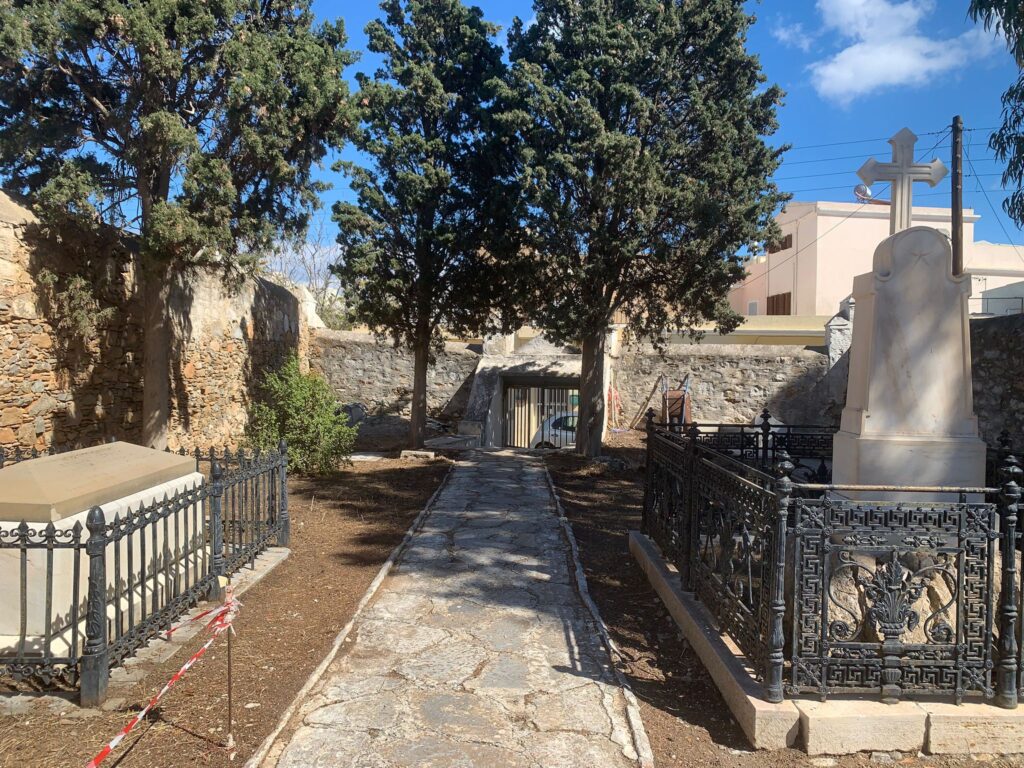
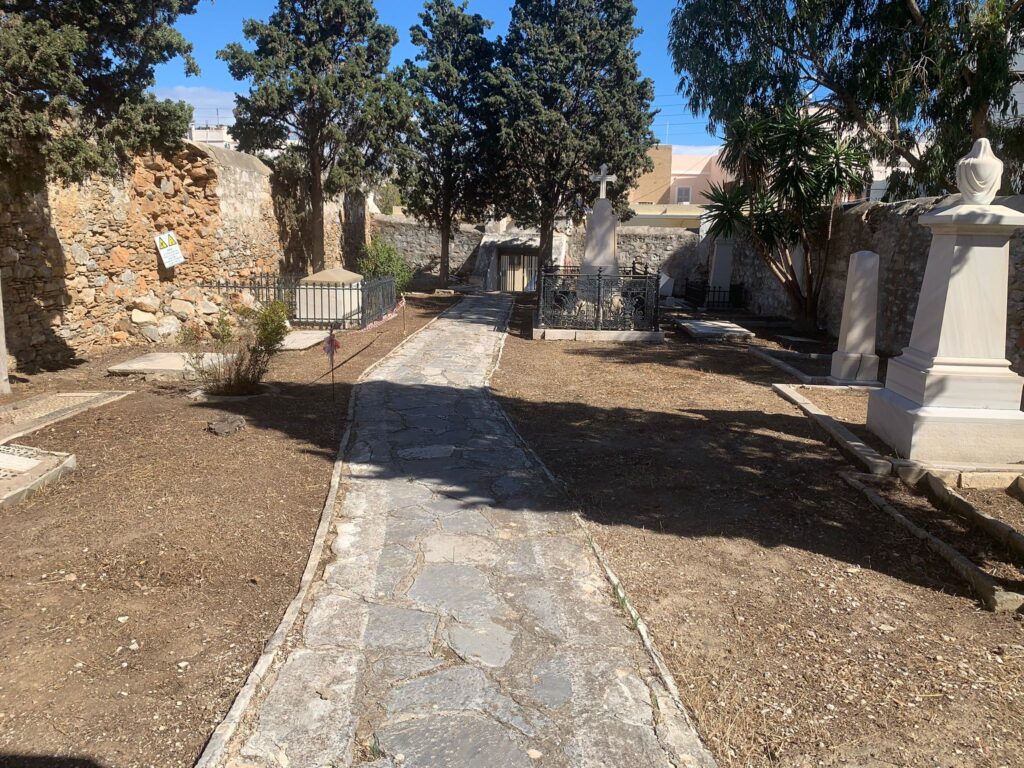
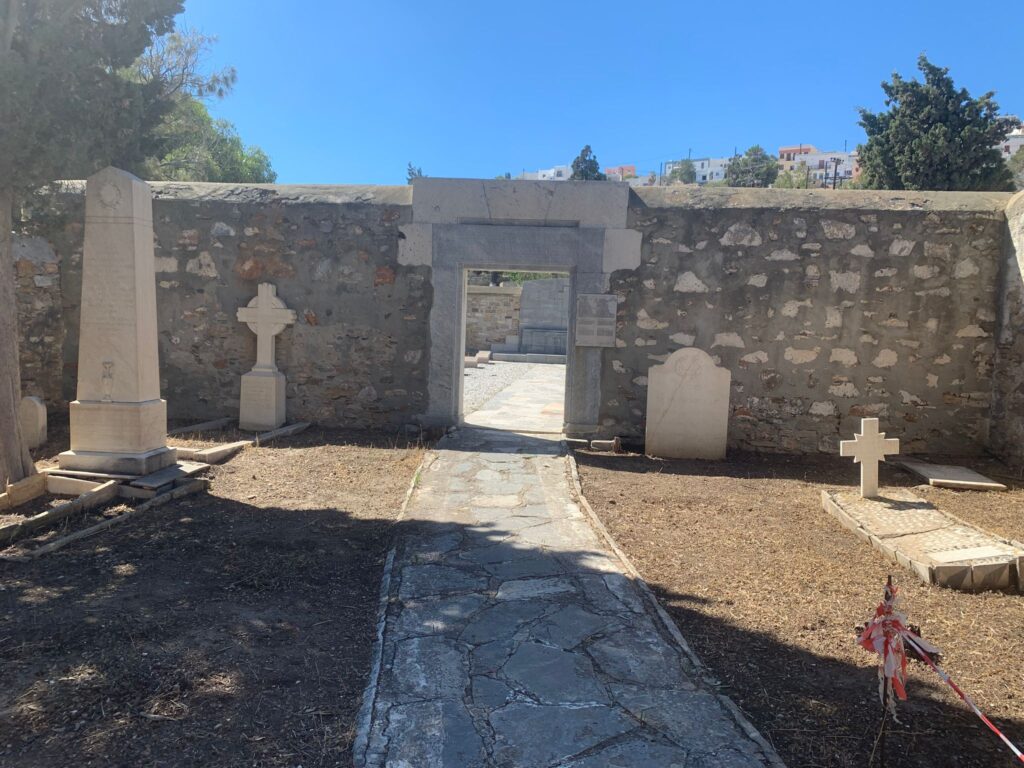
 Leave a comment or contact us about this article
Leave a comment or contact us about this article